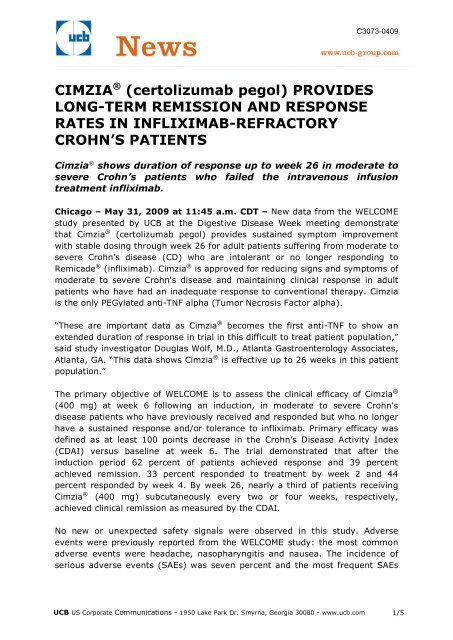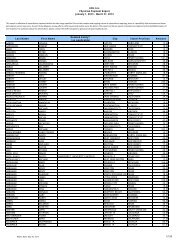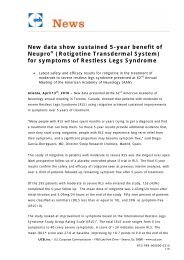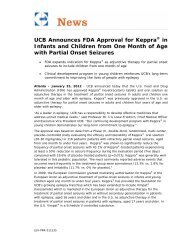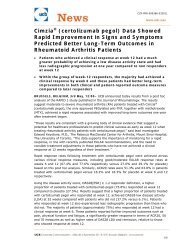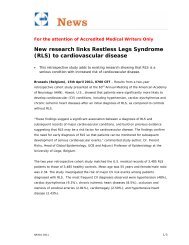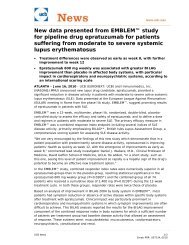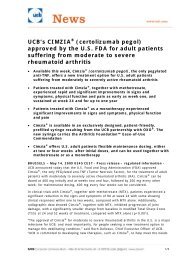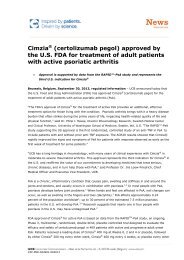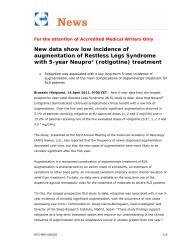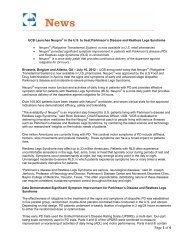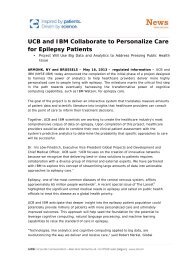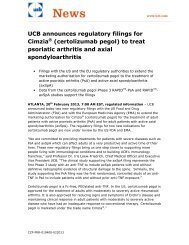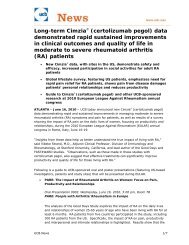CIMZIA® (certolizumab pegol) PROVIDES LONG-TERM ... - UCB
CIMZIA® (certolizumab pegol) PROVIDES LONG-TERM ... - UCB
CIMZIA® (certolizumab pegol) PROVIDES LONG-TERM ... - UCB
You also want an ePaper? Increase the reach of your titles
YUMPU automatically turns print PDFs into web optimized ePapers that Google loves.
C3073-0409<br />
CIMZIA ® (<strong>certolizumab</strong> <strong>pegol</strong>) <strong>PROVIDES</strong><br />
<strong>LONG</strong>-<strong>TERM</strong> REMISSION AND RESPONSE<br />
RATES IN INFLIXIMAB-REFRACTORY<br />
CROHN’S PATIENTS<br />
Cimzia ® shows duration of response up to week 26 in moderate to<br />
severe Crohn’s patients who failed the intravenous infusion<br />
treatment infliximab.<br />
Chicago – May 31, 2009 at 11:45 a.m. CDT – New data from the WELCOME<br />
study presented by <strong>UCB</strong> at the Digestive Disease Week meeting demonstrate<br />
that Cimzia ® (<strong>certolizumab</strong> <strong>pegol</strong>) provides sustained symptom improvement<br />
with stable dosing through week 26 for adult patients suffering from moderate to<br />
severe Crohn’s disease (CD) who are intolerant or no longer responding to<br />
Remicade ® (infliximab). Cimzia ® is approved for reducing signs and symptoms of<br />
moderate to severe Crohn's disease and maintaining clinical response in adult<br />
patients who have had an inadequate response to conventional therapy. Cimzia<br />
is the only PEGylated anti-TNF alpha (Tumor Necrosis Factor alpha).<br />
“These are important data as Cimzia ® becomes the first anti-TNF to show an<br />
extended duration of response in trial in this difficult to treat patient population,”<br />
said study investigator Douglas Wolf, M.D., Atlanta Gastroenterology Associates,<br />
Atlanta, GA. “This data shows Cimzia ® is effective up to 26 weeks in this patient<br />
population.”<br />
The primary objective of WELCOME is to assess the clinical efficacy of Cimzia ®<br />
(400 mg) at week 6 following an induction, in moderate to severe Crohn's<br />
disease patients who have previously received and responded but who no longer<br />
have a sustained response and/or tolerance to infliximab. Primary efficacy was<br />
defined as at least 100 points decrease in the Crohn’s Disease Activity Index<br />
(CDAI) versus baseline at week 6. The trial demonstrated that after the<br />
induction period 62 percent of patients achieved response and 39 percent<br />
achieved remission. 33 percent responded to treatment by week 2 and 44<br />
percent responded by week 4. By week 26, nearly a third of patients receiving<br />
Cimzia ® (400 mg) subcutaneously every two or four weeks, respectively,<br />
achieved clinical remission as measured by the CDAI.<br />
No new or unexpected safety signals were observed in this study. Adverse<br />
events were previously reported from the WELCOME study: the most common<br />
adverse events were headache, nasopharyngitis and nausea. The incidence of<br />
serious adverse events (SAEs) was seven percent and the most frequent SAEs<br />
<strong>UCB</strong> US Corporate Communications - 1950 Lake Park Dr. Smyrna, Georgia 30080 - www.ucb.com<br />
1/5
involved gastrointestinal disorders (five percent) and infections and infestations<br />
(2 percent).<br />
Additional data from the WELCOME study presented at DDW, includes:<br />
• Health-related Quality of Life: Cimzia ® (400 mg) administered at every two<br />
or four weeks similarly improved patient-reported health-related quality of<br />
life as measured by the Inflammatory Bowel Disease Questionnaire (a<br />
validated tool assessing bowel symptoms, systematic symptoms, emotional<br />
function and social function) by Week 26. (Abstract #S1058)<br />
• Efficacy Independent of IFX Dosing: Cimzia ® (400 mg) was efficacious in<br />
rapidly inducing a clinical response in the infliximab-refractory patient<br />
population regardless of the previous dosages of infliximab. (Abstract<br />
#S1064)<br />
“As we continue to study Cimzia ® ’s potential efficacy, we are pleased to be<br />
adding to an impressive body of data that supports the use of Cimzia ® for a<br />
variety of moderate to severe Crohn’s disease patients,” said David Robinson,<br />
vice president and general manager of <strong>UCB</strong>'s Immunology Business Unit.<br />
Recently, <strong>UCB</strong> announced that Cimzia ® is now available to Crohn’s patients in a<br />
pre-filled syringe, developed in partnership with OXO Good Grips ® for<br />
subcutaneous self-administration once every four weeks after initial dosing.<br />
Cimzia ® , manufactured by <strong>UCB</strong>, was approved by the U.S. Food and Drug<br />
Administration on April 22, 2008.<br />
About WELCOME<br />
The WELCOME study is a 539 patient Phase IIIb multicenter 26-Week trial Evaluating the clinical<br />
benefit and tolerability of certoLizumab <strong>pegol</strong> induCtiOn and Maintenance in patients suffering<br />
from Crohn’s disease with prior loss of response or intolErance to infliximab. It consists of an<br />
open-label induction phase (400 mg of Cimzia ® sub-cutaneously at Weeks 0, 2 and 4) and a<br />
double-blind maintenance period (400 mg of Cimzia ® every 2 or 4 weeks from Week 6). The<br />
primary endpoint was defined as the rate of response (defined as a decrease in CDAI score ≥100<br />
points from baseline) at Week 6. Remission was defined as a CDAI score of ≤150 points. After the<br />
induction period, 62 percent of patients achieved response and 39 percent achieved remission.<br />
One-third of patients had responded to treatment by Week 2 (33 percent) and more than forty<br />
percent (44 percent) had responded by Week 4.<br />
About Crohn's Disease<br />
Crohn's disease is a chronic, progressive, destructive disorder that causes inflammation of the<br />
gastrointestinal (GI) tract, most commonly at the end of the small intestine (the ileum) and<br />
beginning of the large intestine (the colon). If not effectively treated, it may result in the need for<br />
surgery and hospitalization. Crohn's disease has been estimated to affect as many as half a million<br />
Americans. People with Crohn's can experience an ongoing cycle of flare-up and remission<br />
throughout their lives. Together with ulcerative colitis, Crohn's disease is an inflammatory bowel<br />
disease (IBD).<br />
<strong>UCB</strong> News<br />
2/5
About CIMZIA ® (<strong>certolizumab</strong> <strong>pegol</strong>)<br />
Cimzia ® is the only PEGylated anti-TNF (Tumor Necrosis Factor). Cimzia ® has a high affinity for<br />
human TNF-alpha, selectively neutralising the pathophysiological effects of TNF-alpha. Over the<br />
past decade, TNF-alpha has emerged as a major target of basic research and clinical investigation.<br />
This cytokine plays a key role in mediating pathological inflammation, and excess TNF-alpha<br />
production has been directly implicated in a wide variety of diseases. The U.S. Food and Drug<br />
Administration (FDA) has approved Cimzia ® for reducing signs and symptoms of Crohn's disease<br />
and maintaining clinical response in adult patients with moderate to severe active disease who<br />
have had an inadequate response to conventional therapy and for the treatment of adults with<br />
moderately to severely active rheumatoid arthritis. Cimzia ® was approved in Switzerland for<br />
induction of a clinical response and for the maintenance of a clinical response and remission in<br />
patients with active Crohn’s disease who have not responded adequately to conventional treatment<br />
in September 2007. <strong>UCB</strong> is also developing Cimzia ® in other autoimmune disease indications.<br />
Cimzia ® is a registered trademark of <strong>UCB</strong> PHARMA S.A.<br />
IMPORTANT SAFETY INFORMATION<br />
Patients treated with CIMZIA are at an increased risk for developing serious infections that may<br />
lead to hospitalization or death. Most patients who developed these infections were taking<br />
concomitant immunosuppressants such as methotrexate or corticosteroids. CIMZIA should be<br />
discontinued if a patient develops a serious infection or sepsis. Reported infections include:<br />
• Active tuberculosis, including reactivation of latent tuberculosis. Patients with tuberculosis<br />
have frequently presented with disseminated or extrapulmonary disease. Patients should<br />
be tested for latent tuberculosis before CIMZIA use and during therapy. Treatment for<br />
latent infection should be initiated prior to CIMZIA use.<br />
• Invasive fungal infections, including histoplasmosis , coccidioidomycosis, candidiasis,<br />
aspergillosis, blastomycosis, and pneumocystosis. Patients with histoplasmosis or other<br />
invasive fungal infections may present with disseminated, rather than localized disease.<br />
Antigen and antibody testing for histoplasmosis may be negative in some patients with<br />
active infection. Empiric anti-fungal therapy should be considered in patients at risk for<br />
invasive fungal infections who develop severe systemic illness.<br />
• Bacterial, viral and other infections due to opportunistic pathogens.<br />
The risks and benefits of treatment with CIMZIA should be carefully considered prior to initiating<br />
therapy in patients with chronic or recurrent infection. Patients should be closely monitored for the<br />
development of signs and symptoms of infection during and after treatment with CIMZIA, including<br />
the possible development of tuberculosis in patients who tested negative for latent tuberculosis<br />
infection prior to initiating therapy.<br />
Serious and sometimes fatal infection due to bacterial, mycobacterial, invasive fungal, viral or other<br />
opportunistic pathogens has been reported in patients receiving TNF-blocking agents. Among opportunistic<br />
infections, tuberculosis, histoplasmosis, aspergillosis, candidiasis, coccidioidomycosis, listeriosis, and<br />
pneumocystosis were the most common. Treatment with CIMZIA should not be initiated in patients with an<br />
active infection, including clinically important localized infections. The risks and benefits of treatment should<br />
be considered prior to initiating therapy in patients with chronic or recurrent infection, who have been exposed<br />
to tuberculosis, who have resided or traveled in areas of endemic tuberculosis or endemic mycoses, such as<br />
histoplasmosis, coccidioidomycosis, or blastomycosis, or with underlying conditions that may predispose them<br />
to infection.<br />
Patients should be evaluated for tuberculosis risk factors and tested for latent infection prior to initiating<br />
CIMZIA and periodically during therapy. Patients should be closely monitored for the development of signs and<br />
symptoms of infections during and after treatment with CIMZIA, including development of tuberculosis in<br />
patients who tested negative for latent tuberculosis infection prior to initiating therapy. CIMZIA should be<br />
discontinued if a patient develops a serious infection or sepsis. Patients who develop a new infection during<br />
treatment with CIMZIA should be closely monitored, undergo a prompt and complete diagnostic workup<br />
appropriate for immunocompromised patients, and appropriate antimicrobial therapy should be initiated.<br />
Appropriate empiric antifungal therapy should also be considered while a diagnostic workup is performed for<br />
patients who develop a serious systemic illness and reside or travel in regions where mycoses are endemic.<br />
During controlled and open-labeled portions of CIMZIA studies of Crohn’s disease and other diseases ,<br />
malignancies (excluding non-melanoma skin cancer) were observed at a rate (95% confidence interval) of 0.5<br />
<strong>UCB</strong> News<br />
3/5
(0.4, 0.7 ) per 100 patient-years among 4,650 CIMZIA-treated patients versus a rate of 0.6 (0.2, 1.7) per 100<br />
patient-years among 1,319 placebo-treated patients. The size of the control group and limited duration of the<br />
controlled portions of the studies preclude the ability to draw firm conclusions. In studies of CIMZIA for Crohn’s<br />
disease and other investigational uses, there was one case of lymphoma among 2,657 CIMZIA-treated patients<br />
and one case of Hodgkin lymphoma among 1,319 placebo-treated patients. In CIMZIA RA clinical trials<br />
(placebo-controlled and open label) a total of three cases of lymphoma were observed among 2,367 patients.<br />
This is approximately 2-fold higher than expected in the general population. Patients with RA, particularly<br />
those with highly active disease, are at a higher risk for the development of lymphoma. The potential role of<br />
TNF blocker therapy in the development of malignancies is not known.<br />
Cases of worsening congestive heart failure (CHF) and new onset CHF have been reported with TNF blockers.<br />
CIMZIA has not been formally studied in patients with CHF. Exercise caution when using CIMZIA in patients<br />
who have heart failure and monitor them carefully.<br />
Symptoms compatible with hypersensitivity reactions, including angioedema, dyspnea, hypotension, rash,<br />
serum sickness, and urticaria, have been reported rarely following CIMZIA administration. If such reactions<br />
occur, discontinue further administration of CIMZIA and institute appropriate therapy.<br />
Use of TNF blockers, including CIMZIA, may increase the risk of reactivation of hepatitis B virus (HBV) in<br />
patients who are chronic carriers of this virus. Some cases have been fatal. Evaluate patients at risk for HBV<br />
infection for prior evidence of HBV infection before initiating CIMZIA therapy. Exercise caution in prescribing<br />
CIMZIA for patients identified as carriers of HBV. Patients who are carriers of HBV and require treatment with<br />
CIMZIA should be closely monitored for clinical and laboratory signs of active HBV infection throughout therapy<br />
and for several months following termination of therapy. In patients who develop HBV reactivation, discontinue<br />
CIMZIA and initiate effective anti-viral therapy with appropriate supportive treatment.<br />
Use of TNF blockers, including CIMZIA, has been associated with rare cases of new onset or exacerbation of<br />
clinical symptoms and/or radiographic evidence of demyelinating disease. Rare cases of neurological disorders,<br />
including seizure disorder, optic neuritis, and peripheral neuropathy have been reported in patients treated<br />
with CIMZIA; the causal relationship to CIMZIA remains unclear. Exercise caution in considering the use of<br />
CIMZIA in patients with these disorders.<br />
Rare reports of pancytopenia, including aplastic anemia, have been reported with TNF blockers. Medically<br />
significant cytopenia (e.g., leukopenia, pancytopenia, thrombocytopenia) has been infrequently reported with<br />
CIMZIA. The causal relationship of these events to CIMZIA remains unclear. Advise all patients to seek<br />
immediate medical attention if they develop signs and symptoms suggestive of blood dyscrasias or infection<br />
(e.g., persistent fever, bruising, bleeding, pallor) while on CIMZIA. Consider discontinuation of<br />
CIMZIA therapy in patients with confirmed significant hematologic abnormalities.<br />
An increased risk of serious infections has been seen in clinical trials of other TNF blocking agents used in<br />
combination with anakinra or abatacept. Formal drug interaction studies have not been performed with<br />
rituximab or natalizumab; however because of the nature of the adverse events seen with these combinations<br />
with TNF blocker therapy, similar toxicities may also result from the use of CIMZIA in these combinations.<br />
Therefore, the combination of CIMZIA with anakinra, abatacept, rituximab, or natalizumab is not<br />
recommended.<br />
Treatment with CIMZIA may result in the formation of autoantibodies and, rarely, in the development of a<br />
lupus-like syndrome. Discontinue treatment if symptoms of lupus-like syndrome develop.<br />
Do not administer live vaccines or attenuated vaccines concurrently with CIMZIA.<br />
Interference with certain coagulation assays has been detected in patients treated with CIMZIA. There is no<br />
evidence that CIMZIA therapy has an effect on in vivo coagulation. CIMZIA may cause erroneously elevated<br />
aPTT assay results in patients without coagulation abnormalities.<br />
In controlled Crohn’s clinical trials, the most common adverse events that occurred in ≥5% of CIMZIA patients<br />
(n=620) and more frequently than with placebo (n=614) were upper respiratory infection (20% CIMZIA, 13%<br />
placebo), urinary tract infection (7% CIMZIA, 6% placebo), and arthralgia (6% CIMZIA, 4% placebo). The<br />
proportion of patients who discontinued treatment due to adverse reactions in the controlled clinical studies<br />
was 8% for CIMZIA and 7% for placebo.<br />
In controlled RA clinical trials, the most common adverse events that occurred in ≥ 3% of patients taking<br />
CIMZIA 200 mg every other week with concomitant methotrexate (n=640) and more frequently than with<br />
placebo with concomitant methotrexate (n=324) were upper respiratory tract infection (6% CIMZIA, 2%<br />
placebo), headache (5% CIMZIA, 4% placebo), hypertension (5% CIMZIA, 2% placebo), nasopharyngitis (5%<br />
CIMZIA, 1% placebo), back pain (4% CIMZIA, 1% placebo), pyrexia (3% CIMZIA, 2% placebo), pharyngitis<br />
(3% CIMZIA, 1% placebo), rash (3% CIMZIA, 1% placebo), acute bronchitis (3% CIMZIA,1% placebo), fatigue<br />
(3% CIMZIA, 1% placebo). Hypertensive adverse reactions were observed more frequently in patients<br />
receiving CIMZIA than in controls. These adverse reactions occurred more frequently among patients with a<br />
baseline history of hypertension and among patients receiving concomitant corticosteroids and non-steroidal<br />
<strong>UCB</strong> News<br />
4/5
anti-inflammatory drugs. Patients receiving CIMZIA 400mg as monotherapy every 4 weeks in RA controlled<br />
clinical trials had similar adverse reactions to those patients receiving CIMZIA 200mg every other week. The<br />
proportion of patients who discontinued treatment due to adverse reactions in the controlled clinical studies<br />
was 5% for CIMZIA and 2.5% for placebo. Please see accompanying full prescribing information or visit<br />
www.Cimzia.com.<br />
About <strong>UCB</strong><br />
<strong>UCB</strong>, Brussels, Belgium (www.ucb.com) is a biopharmaceutical company dedicated to<br />
the research, development and commercialization of innovative medicines with a focus<br />
on the fields of central nervous system and immunology disorders. Employing<br />
approximately 10 000 people in over 40 countries, <strong>UCB</strong> generated revenue of EUR 3.6<br />
billion in 2008. <strong>UCB</strong> is listed on Euronext Brussels (symbol: <strong>UCB</strong>).<br />
Forward-Looking Statement<br />
This press release contains forward-looking statements based on current plans, estimates and<br />
beliefs of management. Such statements are subject to risks and uncertainties that may cause<br />
actual results to be materially different from those that may be implied by such forward-looking<br />
statements contained in this press release. Important factors that could result in such differences<br />
include: changes in general economic, business and competitive conditions, effects of future<br />
judicial decisions, changes in regulation, exchange rate fluctuations and hiring and retention of its<br />
employees.<br />
Further Information<br />
Bert Kelly, Manager, U.S. Communications & Public Relations, <strong>UCB</strong> Group<br />
M: +1 404.784.6303, Bert.Kelly@ucb.com<br />
Eric Miller, Director, U.S. Corporate Communications, <strong>UCB</strong> Group<br />
M: +1 770.970.8569, Eric.Miller@ucb.com<br />
Antje Witte, Vice President, Corporate Communications & Investor Relations, <strong>UCB</strong> Group<br />
T: +32.2.559.9414, Antje.Witte@ucb.com<br />
<strong>UCB</strong> News<br />
5/5


